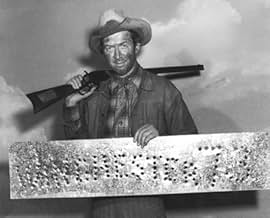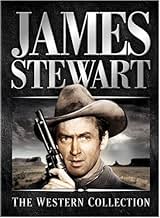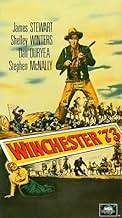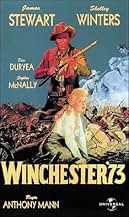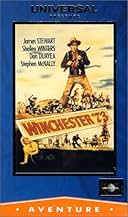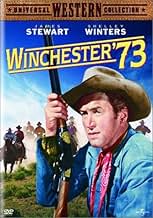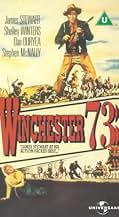A cowboy's obsession with a stolen rifle leads to a bullet-ridden odyssey through the American West.A cowboy's obsession with a stolen rifle leads to a bullet-ridden odyssey through the American West.A cowboy's obsession with a stolen rifle leads to a bullet-ridden odyssey through the American West.
- Director
- Writers
- Stars
- Awards
- 1 win & 1 nomination total
Stephen McNally
- Dutch Henry Brown
- (as Stephen Mc.Nally/Stephen McNally)
Tony Curtis
- Doan
- (as Anthony Curtis)
Victor Adamson
- Townsman
- (uncredited)
Robert Anderson
- Basset
- (uncredited)
- Director
- Writers
- All cast & crew
- Production, box office & more at IMDbPro
Featured reviews
For the viewer who comes upon it long after its making, "Winchester '73" has something in common with "Casablanca." While you watch it, you get this feeling that you're looking at a string of clichés encountered so often in the genre; then you realise that the clichés became clichés only after being copied from this particular film, and that they were so widely copied because this film was so great. In other words, it's a seminal work.
"Winchester '73" is a joy to watch. The broad lines of the plot are somewhat predictable, but mostly because you've seen them copied so many times in later movies, and nevertheless it still contains a number of twists which surprise you. The dialogue, the pacing and Mann's direction are excellent. Stewart shines in particular, and if you're a fan this is a "must-see," but he is not alone in delivering a good performance. Remarkably, many of the most thoughtful and/or witty lines go to minor characters. Because this makes these characters (much) more than cardboard cutouts, it lent additional realism to the film.
This is a remarkably underrated film, and well worth keeping an eye out for. The DVD also contains an interview with Stewart which provides some background on the film.
"Winchester '73" is a joy to watch. The broad lines of the plot are somewhat predictable, but mostly because you've seen them copied so many times in later movies, and nevertheless it still contains a number of twists which surprise you. The dialogue, the pacing and Mann's direction are excellent. Stewart shines in particular, and if you're a fan this is a "must-see," but he is not alone in delivering a good performance. Remarkably, many of the most thoughtful and/or witty lines go to minor characters. Because this makes these characters (much) more than cardboard cutouts, it lent additional realism to the film.
This is a remarkably underrated film, and well worth keeping an eye out for. The DVD also contains an interview with Stewart which provides some background on the film.
Winchester '73 is one of the most enduring and popular films of James Stewart's career, for several reasons; it was the first of five teamings with brilliant, underrated director Anthony Mann, who retooled Stewart's drawling, 'aw-shucks' persona into a laconic, edgier, more flawed hero; it featured a brilliant cast, including Shelley Winters, Dan Duryea, Stephen McNally, John McIntyre, and, in VERY early appearances, Rock Hudson and Tony Curtis; visually, it is spectacular, one of the most beautiful Black and White films ever made, with deep-focus photography highlighting rugged Arizona settings that literally leap from the screen; and, most of all, it is a terrific variation of 'Cain and Abel', told through the premise of the search for a 'one-of-a-kind' rifle Stewart wins in a competition, then loses through treachery. It's the kind of film that offers new insights each time you view it, as the actions and motivations of 'good' brother Stewart and 'bad' brother McNally become better understood.
What truly makes this DVD an 'essential', though, is the bonus track...Described as an 'interview' with Stewart, it is actually an audio commentary that runs through the film, offering not only his reflections about the making of Winchester '73, but insights about his career, working with John Ford, Alfred Hitchcock, and his great friends Henry Fonda and John Wayne, even a nice story about his long-time mount, Pie. Recorded several years ago for the laserdisc edition of Winchester '73, it provides a rare opportunity to hear a screen legend reminisce (and makes you wish Wayne and Fonda had lived long enough to have offered personal observations about THEIR classic films!)
This is a DVD NOT to be missed!
What truly makes this DVD an 'essential', though, is the bonus track...Described as an 'interview' with Stewart, it is actually an audio commentary that runs through the film, offering not only his reflections about the making of Winchester '73, but insights about his career, working with John Ford, Alfred Hitchcock, and his great friends Henry Fonda and John Wayne, even a nice story about his long-time mount, Pie. Recorded several years ago for the laserdisc edition of Winchester '73, it provides a rare opportunity to hear a screen legend reminisce (and makes you wish Wayne and Fonda had lived long enough to have offered personal observations about THEIR classic films!)
This is a DVD NOT to be missed!
Buffs of the adult western that flourished in the 1950s try and trace its origins to the film that kicked off the syndrome. Of course, we can go back to Howard Hawks's Red River (1948) or further still to John Ford's My Darling Clementine (1946), but if we want to stick with this single decade, then it has to be one of a couple of films made in that era's initial year. One is "The Gunfighter," an exquisitely grim tale of a famed gunslinger (Ringo) facing his last shootout. Another from that same year is "Winchester '73," and it's worth noting that Millard Mitchell appears in both as grim, mustached, highly realistic range riders. In The Gunfighter, he's the town marshal expected to arrest Ringo but once rode with him in an outlaw gang. In Winchester, he's the sidekick to Jimmy Stewart, a kind of Horatio to Stewart's Hamlet in this epic/tragic tale. The plot is simple enough: Stewart's lonesome cowpoke wins a remarkable Winchester in a shooting match, beating the meanest man in the west (Stephen McNally), who is actually his own brother and caused the death of their father. When the brother steals the gun, Stewart and Mitchell go after him in a cowboy odyssey that takes them all across the frontier, meeting up with both outlaws and Indians. (In one wonderful bit, two future stars - Rock Hudson and Tony Curtis - play an Indian chief and a U.S. cavalry soldier - during a well staged pitched-battle. Dan Duryea steals the whole show as a giggling outlaw leader, while Shelly Winters, just before she began to gain weight, is fine as the shady lady who ties all the plots together. Today, filmmakers would go on for about four hours to bring such an ambitious idea to the screen, but Anthony Mann does so in an extremely economical amount of time, with not a minute wasted. Such western legends as Bat Masterson and Wyatt Earp (terrifically played by Will Geer) make brief appearances, adding to the historicity as well as the epic nature. The final battle between good and bad brothers, high atop a series of jutting rock canyons, is now legendary among western buffs. It's also worth noting that Stewart, however much associated he became with western films, does what is actually his first western leading man role here - yes, he was in Destry Rides Again eleven years earlier, but was cast in that comedy spoof because he seemed so WRONG for westerns!
One of the great Westerns, Winchester '73 is noteworthy film in many respects, not least because it marked the start of one of the great creative partnerships in the genre, that between director Anthony Mann and James Stewart. Mann had until this time been working successful in low budget films, crafting a series of B-noirs, which have a following on their own account today: titles such as T-Men (1947), Border Incident (1949) and Raw Deal (1948). 1950 brought his first big assignment with the current production, a film which many critics point to as marking the western's emergence into maturity during the decade.
It was also something of a career change for Stewart, whose many roles during his early career had been based around a friendly and frequently homespun persona. Only such films as the documentary noir Call Northside 777, of two years earlier, or odd moments during It's A Wonderful Life hinted at something darker, almost pathological, lurking beneath the amiable exterior. The series of Westerns made with Mann brought this something else to the surface; suddenly this was a dogged, vengeful Stewart, still playing honest men, but men who had often suffered a great wrong and were driven to put things right. (Hitchcock recognised this neurotic dimension to the actor as during the same period he also used him to great effect). Thus in The Man From Laramie (1955) the hero would have his livelihood burnt and be dragged behind a horse by a psychotic, while in Bend Of The River (1952) he is cast out to survive on his own from a wagon train.
As Lin McAdam in Winchester '73 he is already hunting someone who has wronged him: "...chasing him since I can't remember" and then, to add to it all, has a prize rifle stolen from him by his prey after an intense competition. The film focuses on the eponymous weapon as it passes through various hands and Stewart's parallel tracking of his human prey. In some ways his dogged perseverance reminds one of Ethan Edwards' in The Searchers (1956), where obsessive behaviour by a man searching for answers for matters as much internal as external also drives the plot.
McAdam's single-mindedness is a characteristic of many of Mann's Western heroes, a state of mind that approaches the unbalanced in The Naked Spur (1953). Of course McAdam is after getting back his rifle almost as much as he is after vengeance. Later films also feature the wandering weapon storyline - such as American Gun, or The Gun (1974) - the tale of a firearm passing through various hands provides a morality tale hedged around the prevalence of armaments. Winchester '73's central narrative thread has an entirely different purpose, one not generally concerned with social comment. When McAdam's gun is stolen the loss is seen in far more private, almost psychological terms, as if a piece of his personal honour is taken along with the rifle. In fact honour plays a large part in this film: it is either symbolically removed, as in the case of Dutch Henry Brown's early theft; much reduced as shown in the cowardice and subsequent humiliation of Charles Drake; or largely absent, as with the trader selling arms of questionable worth to the warring Indians. And of course besides McAdam's fury at the opening theft, what also drives him on is the dishonourable (because he's shot in the back by someone he trusted) loss of his father.
As critics such as Phil Hardy have noted, during the film McAdam encounters a series of potent father figures, such as Wyatt Earp, Sergeant Wilkes, and Lamont - the presence of who serves to echo and reinforce his own loss. To prove himself worthy of his late father in his own eyes, McAdams has to do is secure the something special he has lost and exact suitable vengeance. The look of the exhausted McAdam's face at the close of the film as he rejoins Lola (Shelley Winters) and his sidekick High Spade (Millard Mitchell) says it all.
In making Winchester '73, Mann was at last given the chance and the budget to make the most of his talents. His previous films had mostly been set amongst cramped and dangerous urban environments. Settling into a new genre he at once showed great response to landscape, and not just in the epic moments like the Indians' attack on Sergeant Wilkes' party. In many of his Westerns it is noticeable that the territory through which characters move is not just the geography of the west but also often a physical echo of the ongoing human drama, as exteriors reflect the emotional state of his characters. Thus at the start of the film we see McAdam moving through open vistas, before his first encounter set amidst the excited human clutter of Dodge. As events proceed, the landscape becomes more and more inhospitable until the film's climax fought out around and amidst bare rocks - a claustrophobic and harsh environment, aptly trapping the two adversaries in their uncompromising duel. Many traditional Westerns tended to save the psychological drama for interiors and the action, taken plain and simple, for outside. Mann's achievement was to resolve this pattern into something more subtle and expressive, opening the way for the deeper resonances in the genre which were to follow.
Winchester '73's plot, which involves several locations and a range of characters and events, could easily have proved episodic. Mann manages to draw all these elements together into a satisfying unity while still allowing the supporting actors to shine and do their thing. One standout is Dan Duryea, in an entirely characteristic performance as Waco Johnny Dean. Dean and Dutch Henry Brown (excellently done by the underrated Stephen McNally) provide excellent turns in villainy. There's a nice touch of symmetry too as the end draws near: McAdam, who had earlier been humiliated by Brown over a drink of milk back in Dodge, faces down Dean over another drink in the cantina.
The excellent DVD transfer shows the film in its best light, not least the splendid black and white photography. Mann rarely moves his camera, but instead shows mastery of composition within the frame and his direction of actors. The depth of focus benefits from the clear digital image, reproduced in the correct academy ratio. If this isn't enough to wet the appetite of any western fan, then there is an unmissable bonus. James Stewart recorded an interview commentary for the title when it appeared on laserdisc years back, and this is included - perhaps one of the very rare occasions that a representative of Hollywood's golden age appears in this way on a western DVD. (I can only otherwise think of Maureen O'Hara's commentary to the Region 1 special edition of Rio Grande.)
It was also something of a career change for Stewart, whose many roles during his early career had been based around a friendly and frequently homespun persona. Only such films as the documentary noir Call Northside 777, of two years earlier, or odd moments during It's A Wonderful Life hinted at something darker, almost pathological, lurking beneath the amiable exterior. The series of Westerns made with Mann brought this something else to the surface; suddenly this was a dogged, vengeful Stewart, still playing honest men, but men who had often suffered a great wrong and were driven to put things right. (Hitchcock recognised this neurotic dimension to the actor as during the same period he also used him to great effect). Thus in The Man From Laramie (1955) the hero would have his livelihood burnt and be dragged behind a horse by a psychotic, while in Bend Of The River (1952) he is cast out to survive on his own from a wagon train.
As Lin McAdam in Winchester '73 he is already hunting someone who has wronged him: "...chasing him since I can't remember" and then, to add to it all, has a prize rifle stolen from him by his prey after an intense competition. The film focuses on the eponymous weapon as it passes through various hands and Stewart's parallel tracking of his human prey. In some ways his dogged perseverance reminds one of Ethan Edwards' in The Searchers (1956), where obsessive behaviour by a man searching for answers for matters as much internal as external also drives the plot.
McAdam's single-mindedness is a characteristic of many of Mann's Western heroes, a state of mind that approaches the unbalanced in The Naked Spur (1953). Of course McAdam is after getting back his rifle almost as much as he is after vengeance. Later films also feature the wandering weapon storyline - such as American Gun, or The Gun (1974) - the tale of a firearm passing through various hands provides a morality tale hedged around the prevalence of armaments. Winchester '73's central narrative thread has an entirely different purpose, one not generally concerned with social comment. When McAdam's gun is stolen the loss is seen in far more private, almost psychological terms, as if a piece of his personal honour is taken along with the rifle. In fact honour plays a large part in this film: it is either symbolically removed, as in the case of Dutch Henry Brown's early theft; much reduced as shown in the cowardice and subsequent humiliation of Charles Drake; or largely absent, as with the trader selling arms of questionable worth to the warring Indians. And of course besides McAdam's fury at the opening theft, what also drives him on is the dishonourable (because he's shot in the back by someone he trusted) loss of his father.
As critics such as Phil Hardy have noted, during the film McAdam encounters a series of potent father figures, such as Wyatt Earp, Sergeant Wilkes, and Lamont - the presence of who serves to echo and reinforce his own loss. To prove himself worthy of his late father in his own eyes, McAdams has to do is secure the something special he has lost and exact suitable vengeance. The look of the exhausted McAdam's face at the close of the film as he rejoins Lola (Shelley Winters) and his sidekick High Spade (Millard Mitchell) says it all.
In making Winchester '73, Mann was at last given the chance and the budget to make the most of his talents. His previous films had mostly been set amongst cramped and dangerous urban environments. Settling into a new genre he at once showed great response to landscape, and not just in the epic moments like the Indians' attack on Sergeant Wilkes' party. In many of his Westerns it is noticeable that the territory through which characters move is not just the geography of the west but also often a physical echo of the ongoing human drama, as exteriors reflect the emotional state of his characters. Thus at the start of the film we see McAdam moving through open vistas, before his first encounter set amidst the excited human clutter of Dodge. As events proceed, the landscape becomes more and more inhospitable until the film's climax fought out around and amidst bare rocks - a claustrophobic and harsh environment, aptly trapping the two adversaries in their uncompromising duel. Many traditional Westerns tended to save the psychological drama for interiors and the action, taken plain and simple, for outside. Mann's achievement was to resolve this pattern into something more subtle and expressive, opening the way for the deeper resonances in the genre which were to follow.
Winchester '73's plot, which involves several locations and a range of characters and events, could easily have proved episodic. Mann manages to draw all these elements together into a satisfying unity while still allowing the supporting actors to shine and do their thing. One standout is Dan Duryea, in an entirely characteristic performance as Waco Johnny Dean. Dean and Dutch Henry Brown (excellently done by the underrated Stephen McNally) provide excellent turns in villainy. There's a nice touch of symmetry too as the end draws near: McAdam, who had earlier been humiliated by Brown over a drink of milk back in Dodge, faces down Dean over another drink in the cantina.
The excellent DVD transfer shows the film in its best light, not least the splendid black and white photography. Mann rarely moves his camera, but instead shows mastery of composition within the frame and his direction of actors. The depth of focus benefits from the clear digital image, reproduced in the correct academy ratio. If this isn't enough to wet the appetite of any western fan, then there is an unmissable bonus. James Stewart recorded an interview commentary for the title when it appeared on laserdisc years back, and this is included - perhaps one of the very rare occasions that a representative of Hollywood's golden age appears in this way on a western DVD. (I can only otherwise think of Maureen O'Hara's commentary to the Region 1 special edition of Rio Grande.)
The picture is developed in 1873 and talks about Lin McAdam (James Stewart , extremely anxious to show up in more challenging characters) and High Spade (Millard Michell) arrive in Dodge City looking for an enemy called Dutch Henry (Stephen McNally) . The sheriff Wyatt Hearp (Will Geer , though initially felt he was badly miscast ) obligates them to leave their guns . Both of them participate in a shot-contest and Stewart shot (actually shot by renowned marksman Herb Parsons) a bullet through the washer with the postage stamp, then he earns a Winchester 73 , the greatest rifle in the west , but it is robbed and starting the possession through hand to hand (John McIntire , Charles Drake , Dan Duryea) . Meanwhile , the starring going on a merciless vengeance.
First western interpreted by James Stewart , subsequently following a lot , most of them directed by Anthony Mann ; formerly , in the early 1930s Stewart had worked with Mann in the theater . At the time of shooting , James was very worried that the general perception was of him as a limited actor, then he found filmmaker Anthony Mann very helpful in breaking that perception. Both , Stewart and Mann achieved to revive the genre during the decade 50s . James Stewart inaugurated a new type of wage, the percentage on the box office that will imitate posteriorly others great Hollywood stars . The film has an extraordinary casting , including brief apparition by Rock Hudson and Tony Curtis , both of whom newcomers . Of course, all the western's essential elements are in this film, such as : Shootouts , Red Indian attack , violent raids by outlaws , final showdown , among others .
The breathtaking cinematography in black and white is made by Greta Garbo's favourite photographer : Willian Daniels . Although the script results to be an adaptation based on ¨Big gun¨ , a novel written by Stuart L. Lake and screenwriter by prestigious Borden Chase, being also based about real events because 4 July 1876 in Dodge City had a shot competition and the winner was rewarded with a Winchester 73 model 1873 with ability shoot 17 cartridges caliber 44/40 in a few seconds .The picture was well narrated and directed by the magnificent director Anthony Mann , though Fritz Lang was originally slated to direct this movie , when he backed out, James Stewart recommended Anthony Mann . Anthony made abundant classic western , such as : ¨Bend the river¨ , ¨Far country¨ , ¨Man of Laramie¨ , ¨Naked spur¨, ¨Tin star¨ and several others . Better than average . Rating : 8/10. Well worth watching .
First western interpreted by James Stewart , subsequently following a lot , most of them directed by Anthony Mann ; formerly , in the early 1930s Stewart had worked with Mann in the theater . At the time of shooting , James was very worried that the general perception was of him as a limited actor, then he found filmmaker Anthony Mann very helpful in breaking that perception. Both , Stewart and Mann achieved to revive the genre during the decade 50s . James Stewart inaugurated a new type of wage, the percentage on the box office that will imitate posteriorly others great Hollywood stars . The film has an extraordinary casting , including brief apparition by Rock Hudson and Tony Curtis , both of whom newcomers . Of course, all the western's essential elements are in this film, such as : Shootouts , Red Indian attack , violent raids by outlaws , final showdown , among others .
The breathtaking cinematography in black and white is made by Greta Garbo's favourite photographer : Willian Daniels . Although the script results to be an adaptation based on ¨Big gun¨ , a novel written by Stuart L. Lake and screenwriter by prestigious Borden Chase, being also based about real events because 4 July 1876 in Dodge City had a shot competition and the winner was rewarded with a Winchester 73 model 1873 with ability shoot 17 cartridges caliber 44/40 in a few seconds .The picture was well narrated and directed by the magnificent director Anthony Mann , though Fritz Lang was originally slated to direct this movie , when he backed out, James Stewart recommended Anthony Mann . Anthony made abundant classic western , such as : ¨Bend the river¨ , ¨Far country¨ , ¨Man of Laramie¨ , ¨Naked spur¨, ¨Tin star¨ and several others . Better than average . Rating : 8/10. Well worth watching .
Did you know
- TriviaJames Stewart credited this film with saving and redefining his career after a series of postwar flops threatened to seriously damage it.
- GoofsThis movie is based on a rifle-shooting competition held in Dodge City on 4 July 1876. During a poker game in the movie, Dutch refers to a "Dead Man's Hand". This refers to the poker hand 'Wild Bill' Hickok was holding when he was shot in the back by Jack McCall on 2 August 1876 - less than a month later. It was too soon for the "Dead Man's Hand" to be a famous phrase. However, per IMDb guidelines for Anachronisms, "a good deal of leeway" is allowed; linguistic anachronisms are usually excused (modern words in historical films) - "always bear in mind that it's entertainment not documentary."
- Quotes
Wyatt Earp: That's Dutch Henry Brown. I thought you said you didn't know him.
Lin McAdam: I said I didn't recall the name.
- Crazy creditsThe film's opening prologue states: This is a story of the Winchester Rifle Model 1873 "The gun that won the West" To cowman, outlaw, peace officer or soldier, the Winchester '73 was a treasured possession. An Indian would sell his soul to own one . . .
- ConnectionsFeatured in MacArthur, le général rebelle (1977)
- How long is Winchester '73?Powered by Alexa
Details
- Runtime1 hour 32 minutes
- Color
- Aspect ratio
- 1.37 : 1
Contribute to this page
Suggest an edit or add missing content


